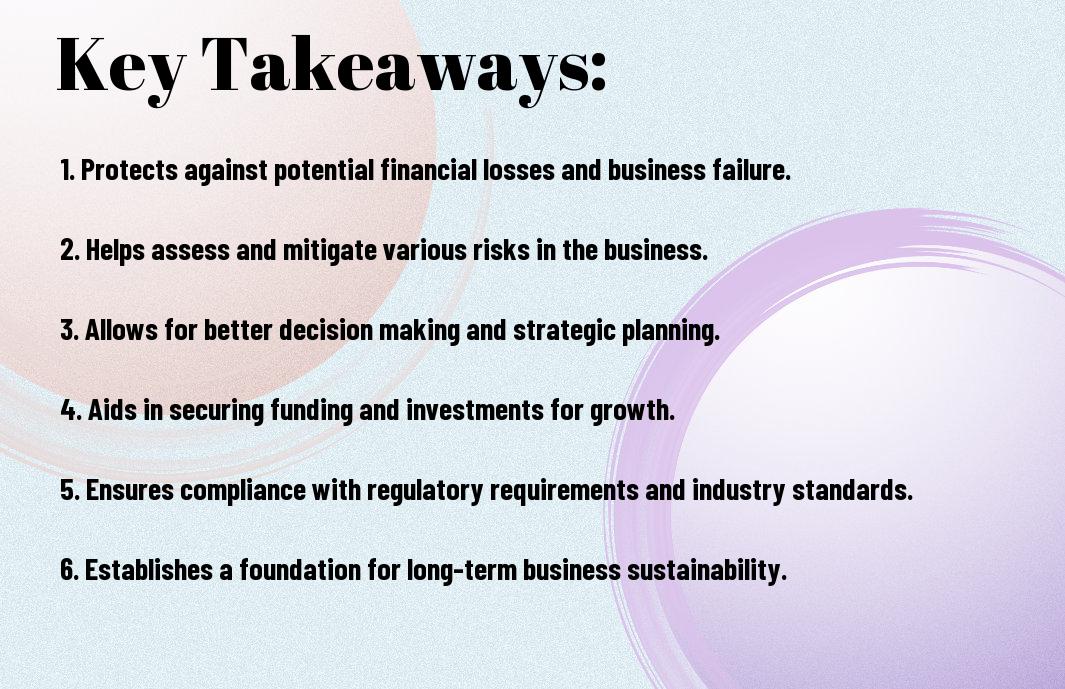Why Is Financial Risk Management Crucial for Small Businesses?
As a small business owner, you may often feel overwhelmed by the complexities of managing your company’s finances. However, ignoring the importance of financial risk management can lead to dire consequences for your business. Every decision you make regarding your finances, from investments to budgeting, carries some level of risk. Without proper risk management in place, you are leaving your business vulnerable to unexpected financial losses that could potentially threaten the survival of your company.
Implementing effective financial risk management strategies can help safeguard your business from potential threats and uncertainties. By identifying and analyzing the various financial risks your business may face, you can make informed decisions and take proactive steps to mitigate these risks. This can ultimately lead to improved financial stability and better overall performance for your small business.
Key Takeaways:
- Protection against uncertainties: Financial risk management helps small businesses to protect themselves against unpredictable events such as economic downturns, market fluctuations, or industry changes.
- Improved decision-making: By understanding and managing financial risks, small businesses can make informed decisions that are beneficial for their long-term success and sustainability.
- Enhanced credibility: Implementing strong financial risk management practices can improve a small business’s credibility with investors, lenders, and other stakeholders, potentially leading to better opportunities for growth and expansion.
- Compliance with regulations: Effective financial risk management enables small businesses to comply with legal and regulatory requirements, avoiding potential penalties and reputational damage.
- Long-term viability: By proactively addressing financial risks, small businesses can increase their chances of long-term viability and resilience in the face of economic challenges.
Fundamentals of Financial Risk Management
Assuming you are a small business owner, you must understand the fundamentals of financial risk management to protect your business from potential losses. Financial risk management involves identifying, analyzing, and managing the various risks that could affect your business’s financial health. By implementing effective risk management strategies, you can safeguard your business from market volatility, economic downturns, and other financial uncertainties.
Types of Financial Risks Faced by Small Businesses
Small businesses face a range of financial risks that can impact their operations and profitability. These risks include market risk, which arises from changes in market conditions and can lead to losses in investment portfolios or inventory values. Credit risk is another concern, as it involves the potential for customers or suppliers to default on their payments. Interest rate risk is a factor for businesses with variable interest rate loans, as fluctuations can affect borrowing costs. Liquidity risk arises when a business cannot meet its short-term financial obligations, and operational risk is associated with internal processes and systems that can lead to financial losses. This information is summarized in the following table:
| Market Risk | Changes in market conditions |
|---|---|
| Credit Risk | Default by customers or suppliers |
| Interest Rate Risk | Fluctuations in borrowing costs |
| Liquidity Risk | Inability to meet short-term obligations |
| Operational Risk | Internal systems and processes |
This understanding of the types of financial risks you may face is critical in developing a comprehensive risk management strategy for your small business.
Components of an Effective Financial Risk Management Program
An effective financial risk management program involves several key components that must be carefully implemented to mitigate potential threats. These components include risk identification and assessment, risk mitigation strategies, monitoring and control, and response planning. By identifying and assessing the various risks, you can develop strategies to minimize their impact on your business. Monitoring and control mechanisms are essential to ensure that these strategies are effective, while response planning allows you to act swiftly in the event of a financial crisis. It is crucial to understand how each of these components contributes to the overall effectiveness of your risk management program.
By addressing the fundamentals of financial risk management, understanding the types of risks faced by small businesses, and implementing an effective risk management program, you can protect your business from potential financial losses and improve its overall financial stability. It’s important to take proactive measures to safeguard your business’s financial health and secure its long-term success.

Tools and Techniques in Financial Risk Management
However, the success of financial risk management for small businesses relies heavily on the tools and techniques used. There are various traditional methods and innovative financial technologies (Fintech) solutions that can be employed to effectively manage financial risk and ensure the stability and growth of your business.
Traditional Tools Used in Risk Management
When it comes to traditional tools used in risk management, methods such as insurance, derivatives, and hedging strategies play a crucial role in protecting your small business from potential financial losses. Insurance policies can provide coverage for various risks such as property damage, liability, and employee-related risks. Derivatives, on the other hand, offer a way to hedge against fluctuations in interest rates, exchange rates, and commodity prices. Additionally, hedging strategies can help in mitigating the impact of market volatility on your business operations.
Small businesses can also leverage the use of risk assessments, internal controls, and financial planning to identify and manage financial risks. Risk assessments allow you to evaluate potential threats and vulnerabilities to your business, while internal controls help in preventing and detecting financial risks. Moreover, comprehensive financial planning enables you to create a roadmap for managing and minimizing risks while pursuing your business objectives.
Innovative Financial Technologies (Fintech) Solutions
In today’s digital age, innovative financial technologies (Fintech) solutions have revolutionized the way small businesses manage financial risk. Fintech tools such as predictive analytics, automated risk assessment software, and blockchain technology offer efficient and real-time risk management capabilities. Predictive analytics can help in forecasting future financial risks by analyzing historical data and identifying potential patterns and trends. Automated risk assessment software can streamline the process of evaluating and monitoring risks, while blockchain technology provides secure and tamper-proof record-keeping for financial transactions.
Moreover, fintech solutions also include cloud-based financial management platforms, which offer scalability, flexibility, and accessibility for small businesses to manage their financial risk effectively. These platforms provide real-time visibility into your financial data, enabling you to make informed decisions and respond promptly to any risk-related challenges. By leveraging these innovative fintech solutions, you can significantly enhance your financial risk management capabilities, ensuring the long-term success and sustainability of your small business.
In conclusion, the use of traditional tools and innovative fintech solutions in financial risk management is essential for the security and growth of your small business. By implementing a combination of these tools and techniques, you can effectively identify, assess, and mitigate financial risks, ultimately safeguarding your business from potential pitfalls and uncertainties. Whether you choose to rely on traditional methods or embrace the latest fintech solutions, the key is to adapt and evolve in response to the ever-changing financial landscape. Are you ready to take proactive measures to safeguard your small business from financial risks and secure its future success?
Building a Resilient Financial Framework
Now that you understand the crucial importance of financial risk management for small businesses, it’s time to focus on building a resilient financial framework. By implementing a robust financial risk management strategy, you can safeguard your business from unexpected challenges and secure its long-term success. If you want to learn more about the 8 Advantages of Financial Risk Management, click here.
Capital Management and Allocation
One of the key aspects of building a resilient financial framework is effective capital management and allocation. As a small business owner, it’s essential to allocate your capital strategically to maximize growth and minimize risks. You must determine how much capital to invest in different areas of your business, such as operations, marketing, and expansion. By properly managing and allocating your capital, you can ensure that your business has the financial resources it needs to thrive while mitigating unnecessary financial risks.
Cash Flow Management and Forecasting
Cash flow management and forecasting are critical components of a resilient financial framework. Maintaining a healthy cash flow is essential to the financial stability of your small business. By effectively managing your cash flow and forecasting future inflows and outflows, you can identify potential financial risks and take proactive measures to mitigate them. Implementing robust cash flow management practices will help you avoid cash shortages and ensure that you can meet your financial obligations on time, safeguarding your business from potential financial crises.
The Role of Financial Planning and Analysis
Despite the size of your small business, it is crucial to have a solid financial planning and analysis in place to effectively manage financial risk. This involves understanding your financial situation and using that insight to make informed decisions that will drive your business forward. According to a recent article on the Importance of Risk Management in Small Businesses, having a clear financial plan and the ability to analyze your financial data is essential to mitigating risks and capitalizing on opportunities.
Creating a Financial Plan
Creating a financial plan is the first step in managing financial risk for your small business. This involves setting clear financial goals, creating a budget, and forecasting your cash flow. By having a comprehensive financial plan in place, you can ensure that you are prepared for potential risks and have a roadmap for achieving your business objectives. Your financial plan will serve as a guide on how to allocate resources, manage expenses, and identify potential areas for growth.
Scenario Analysis and Stress Testing
In addition to creating a financial plan, conducting scenario analysis and stress testing can help you assess the potential impact of different financial scenarios on your business. By analyzing various financial outcomes, you can identify potential risks and opportunities and develop strategies to mitigate potential losses. This proactive approach to risk management will help you anticipate and prepare for potential challenges, giving you a competitive edge in the market.
Regulatory Compliance and Risk Reporting
To ensure the smooth functioning of your small business and protect it from potential financial risks, you must adhere to regulatory compliance and ensure transparent risk reporting. In this chapter, we will discuss the importance of keeping abreast with financial regulations and the necessity of transparent reporting in mitigating financial risks.
Keeping Abreast with Financial Regulations
As a small business owner, it is crucial for you to stay updated with the ever-changing financial regulations. Regulatory compliance ensures that your business operates within legal boundaries and minimizes the risk of facing penalties, fines, or even legal action. Non-compliance with financial regulations can lead to severe consequences, jeopardizing the financial stability and reputation of your business. Therefore, it is essential to constantly monitor and understand the regulatory landscape to ensure that your business is compliant.
Moreover, staying informed about financial regulations will help you anticipate any potential changes that could impact your business operations. By understanding the regulatory environment, you can proactively adapt your business practices and risk management strategies to align with the latest requirements. This proactive approach can safeguard your business from unexpected compliance issues and financial risks, ultimately contributing to its long-term success and sustainability.
The Necessity of Transparent Reporting
Transparent reporting is a fundamental aspect of financial risk management for small businesses. It provides stakeholders, including investors, creditors, and regulatory authorities, with a clear overview of your business’s financial health and risk exposure. By accurately and openly reporting financial data, you demonstrate your commitment to integrity and accountability, building trust and credibility with stakeholders. Additionally, transparent reporting enables you to identify and address potential risks proactively, mitigating their impact on your business’s financial stability.
Furthermore, transparent reporting enhances your business’s decision-making processes by providing the necessary insights into its financial performance and risk profile. It allows you to assess the effectiveness of your risk management strategies and make informed adjustments to protect your business from potential threats. By maintaining transparent reporting practices, you establish a foundation for sustainable growth and resilience in the face of financial challenges.
Case Studies: Risk Management Successes and Failures
Lastly, let’s take a look at some case studies to understand the impact of financial risk management on small businesses. These examples will provide insight into the consequences of both successful and failed risk management strategies.
- Case Study 1: Company ABC implemented a comprehensive risk management plan, including regular financial assessments and hedging strategies. As a result, they were able to mitigate potential losses during a market downturn and maintain stable cash flow.
- Case Study 2: On the other hand, Company XYZ neglected to actively manage financial risks, leading to significant losses when interest rates suddenly spiked. This oversight put the business in a precarious financial situation, impacting operations and growth opportunities.
Tales of Caution: Small Businesses That Neglected Risk Management
Many small businesses have faced detrimental consequences due to neglecting financial risk management. For example, a local restaurant failed to anticipate the impact of fluctuating food prices, leading to unexpected cost increases that severely impacted their bottom line. Without a proactive risk management strategy in place, the business struggled to adapt to the financial challenges, ultimately leading to its closure.
Success Stories: Effective Risk Management in Practice
Conversely, there are numerous success stories of small businesses that effectively implemented financial risk management strategies. By actively monitoring market trends, identifying potential risks, and implementing appropriate safeguards, these businesses were able to navigate through uncertain economic conditions and maintain financial stability. This proactive approach not only protected their assets but also positioned them for future growth and expansion.


Conclusion: The Importance of Financial Risk Management for Small Businesses
From above, it is clear that financial risk management is crucial for small businesses to ensure their long-term success and stability. By identifying potential risks and implementing strategies to mitigate them, you can protect your business from adverse financial impacts and improve its resilience in the face of economic uncertainties. It also helps you make well-informed decisions that contribute to the growth and sustainability of your business, ultimately enhancing your competitiveness in the market.
Furthermore, effective financial risk management can also provide you with opportunities to capitalize on market fluctuations and leverage your resources for business expansion. By taking control of your financial risks, you can build a strong foundation for your business’s financial health and future growth, securing your position in the market and increasing your chances of success in the long run. By prioritizing financial risk management, you can safeguard your business’s financial well-being and create a more secure and prosperous future for your small business.
FAQ
Q: Why is financial risk management crucial for small businesses?
A: Financial risk management is crucial for small businesses because it helps them identify and mitigate potential financial challenges. By managing risks such as market fluctuations, economic downturns, and cash flow issues, small businesses can safeguard their financial stability and protect themselves from potential crises that could threaten their survival.
Q: What are the benefits of implementing financial risk management strategies for small businesses?
A: Implementing financial risk management strategies enables small businesses to make informed decisions and mitigate the impact of potential financial risks. This can lead to improved financial stability, reduced vulnerability to unforeseen events, and enhanced business resilience. Additionally, effective risk management can also help small businesses gain a competitive edge and build investor and creditor confidence.
Q: How can small businesses effectively implement financial risk management practices?
A: Small businesses can effectively implement financial risk management practices by conducting a comprehensive risk assessment to identify potential threats. It is essential to develop and implement risk mitigation strategies, establish a robust financial reporting and monitoring system, and regularly review and adjust risk management plans as the business environment evolves. Seeking professional advice from financial experts or consultants can also help small businesses navigate complex financial risks and develop effective risk management strategies.


